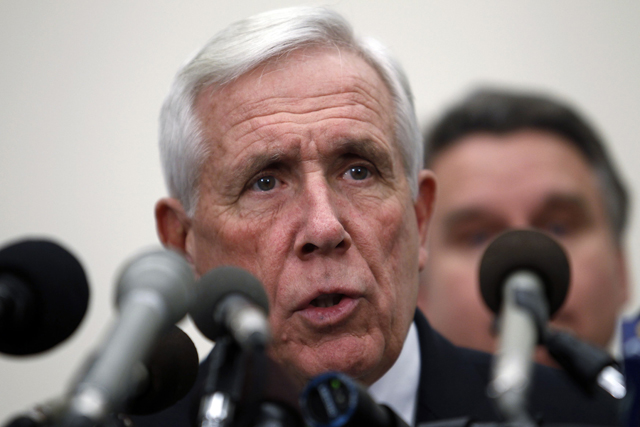Wolf Urges Select Committee on Benghazi
Helle Dale /
Congressman Frank Wolf (R–VA) last week on the floor of the House redoubled his efforts to create a congressional select committee to investigate Benghazi. More than a year has passed since the terrorist attack on the U.S. diplomatic facility, and far too many questions remain unanswered.
Nearly 11 months ago, Wolf introduced a measure to create a select committee. It now has 178 cosponsors, including three-quarters of the Republican conference and nearly three-quarters of the Republican Members who serve on the committees already investigating Benghazi. A majority of Americans, according to a bipartisan poll published last week, believe a select committee is necessary to get to the truth.
Five different House committees have held hearings on Benghazi, but despite their best efforts, lack of coordination and limited jurisdiction have resulted in an incomplete picture of what happened the night of September 11, 2012. A select committee would bring together members from all five committees with their experts to formulate a coherent investigative strategy, and it would give them the power to subpoena the necessary eyewitnesses and members of the Obama Administration.
Wolf pointed to several recent developments, which add to the urgency of getting real answers.
- He cited Fox News’s Catherine Herridge for reporting that one of the suspects was believed to be a courier for al-Qaeda and another a bodyguard in Afghanistan prior to the 2001 terror attacks. Therefore, direct ties to the al-Qaeda senior leadership undercut early claims by the Obama Administration that isolated “extremists” were responsible.
- Further, Wolf cited the 60 Minutes piece on Benghazi on Sunday in which CBS’s sources confirmed that a quick reaction force from the CIA annex ignored orders to wait and raced to the Benghazi compound under attack—despite previous official accounts that no reinforcement was possible at the time.
- In the segment CBS’s Lara Logan also stated something that the congressional committees have run into time and again hampering their ability to investigate—i.e., “an extraordinary amount of pressure on anyone in the government—the military side, the political side—not to say anything outside of official channels.”
These new factors just add to the long list of lingering questions the Obama Administration has never answered, such as: Why were the State Department and the CIA in Benghazi in the first place? Why did we not pull out when the security situation was obviously so fragile?
The absence of military response and assets to aid the Americans stationed in Benghazi has never been satisfactorily explained, nor have the actions of President Obama and his cabinet members in Washington. The lack of investigative zeal by the FBI is itself a mystery, not to mention the lack of arrests of known terrorists who were involved in the attack and are openly operating in Benghazi to this day.
The list goes on. What happened in Benghazi was a national disgrace and remains an open wound.

